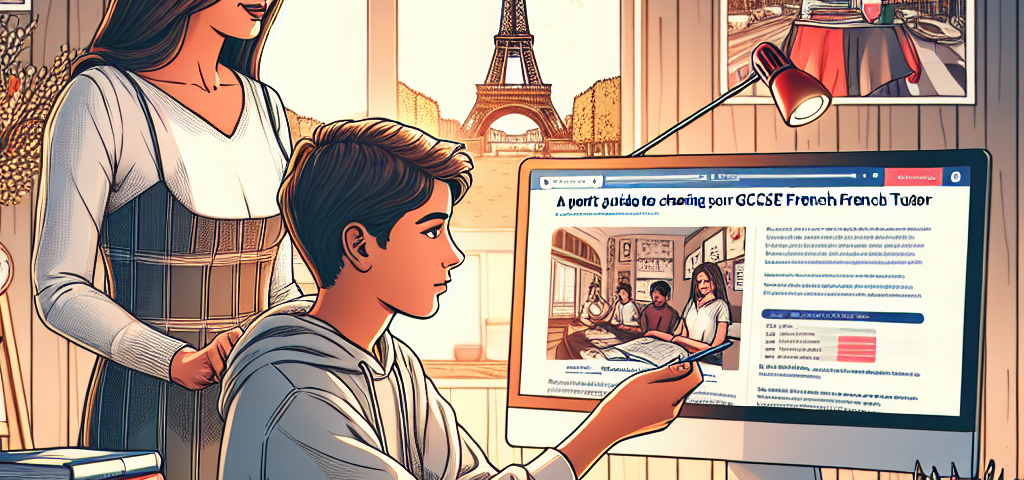
Navigating French Nouns: A Simple Guide for Beginners
May 27, 2025
The Importance of Listening Skills in A-Level French: Strategies for Improvement
May 27, 2025
Navigating the world of education can be challenging, especially when it comes to ensuring that your child receives the best support possible. If your child is studying for their GCSEs in French, finding a qualified tutor can make a significant difference in their comprehension and confidence. Here’s a comprehensive guide to help you make the right choice.
1. Assess Your Child’s Needs
Identifying Strengths and Weaknesses
Before you start looking for a tutor, it’s important to understand your child’s current proficiency in French. Are they struggling with speaking, writing, or grammar? Or do they simply need help with exam preparation? Having a clear idea of their challenges and goals will help you find a suitable tutor.
Defining Goals
Do you want your child to enhance their conversational skills, prepare for exams, or develop a deeper understanding of French culture? Define these objectives to guide your tutor search.
2. Qualifications and Experience
Tutor Credentials
Look for a tutor with relevant qualifications, such as a degree in French, education, or linguistics. Certifications in teaching or tutoring can also be a plus. Experienced tutors often understand the curriculum better and have effective teaching strategies.
Teaching Experience
Experience, especially with the GCSE curriculum, is crucial. A tutor who has worked with students at the same level as your child will likely be familiar with the demands of the exams and what examiners look for.
3. Teaching Style and Personal Fit
Interactive Learning
Language acquisition is often most effective through interactive and engaging methods. Inquire about the tutor’s approach. Effective tutors often use a mix of conversation, reading, writing exercises, and games to enhance learning.
Personal Compatibility
It’s essential for your child to feel comfortable with their tutor. If possible, arrange an introductory session to see how well they connect. A good rapport can significantly enhance your child’s motivation and learning experience.
4. Tutoring Format
One-on-One vs. Group Lessons
Decide whether your child would benefit more from one-on-one tutoring or group lessons. One-on-one sessions offer personalized attention, while group lessons can foster communication skills in a conversational setting.
Online vs. In-Person Tutoring
Consider your logistics and your child’s learning preference when deciding between online and in-person tutoring. Online sessions can offer flexibility, but some students perform better in a traditional classroom setup.
5. Assessing Progress and Feedback
Regular Assessments
A good tutor should regularly assess your child’s progress and adapt their teaching methods accordingly. Discuss how they plan to measure improvement and provide feedback.
Communication with Parents
Frequent updates on your child’s progress can help you stay informed and involved in their education. Make sure the tutor is willing to communicate with you and discuss any concerns.
6. Cost Considerations
Budgeting for Tutoring
Tutoring costs can vary widely based on location, tutor experience, and session duration. Determine your budget beforehand and look for tutors who fit within it. Remember that higher fees do not always equate to better quality.
Return on Investment
Consider the long-term benefits of investing in a good tutor. Improved grades and greater confidence can lead to better options for further education, making it a worthwhile investment.
7. Seek Recommendations
Word of Mouth
Word-of-mouth recommendations from friends, family, or teachers can be invaluable. Ask for suggestions and personal experiences to help narrow down your options.
Reviews and Testimonials
Don’t underestimate the power of online reviews. Platforms that facilitate tutor listings often feature testimonials from previous students and parents, giving insight into the tutor’s effectiveness and teaching style.
Conclusion
Choosing the right GCSE French tutor involves careful consideration of your child’s unique needs, the tutor’s qualifications and experience, teaching style, and other logistical factors. By following this guide, you can ensure that you make an informed decision that aligns with your child’s educational goals. A great tutor can not only enhance language skills but also foster a lifelong love for learning.

